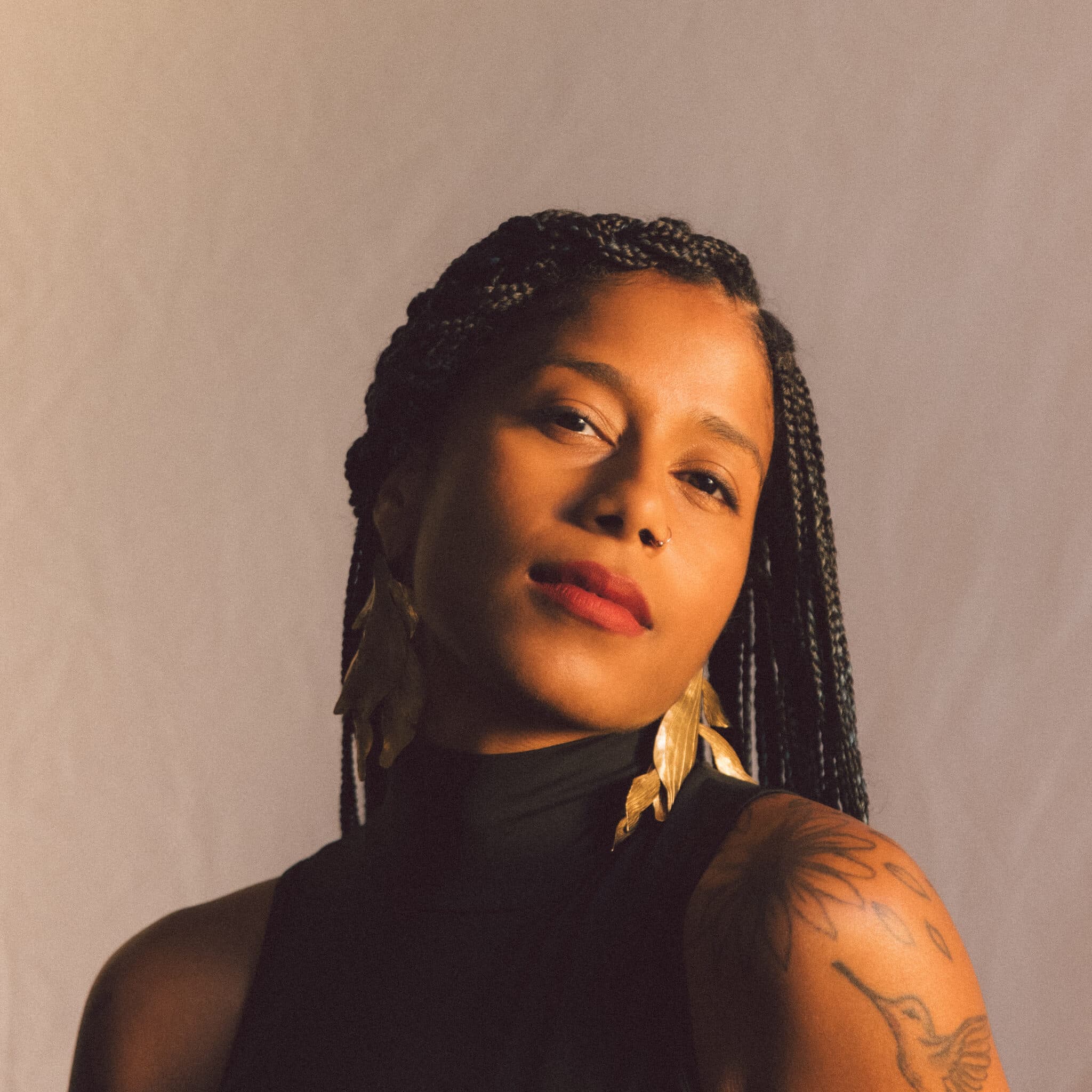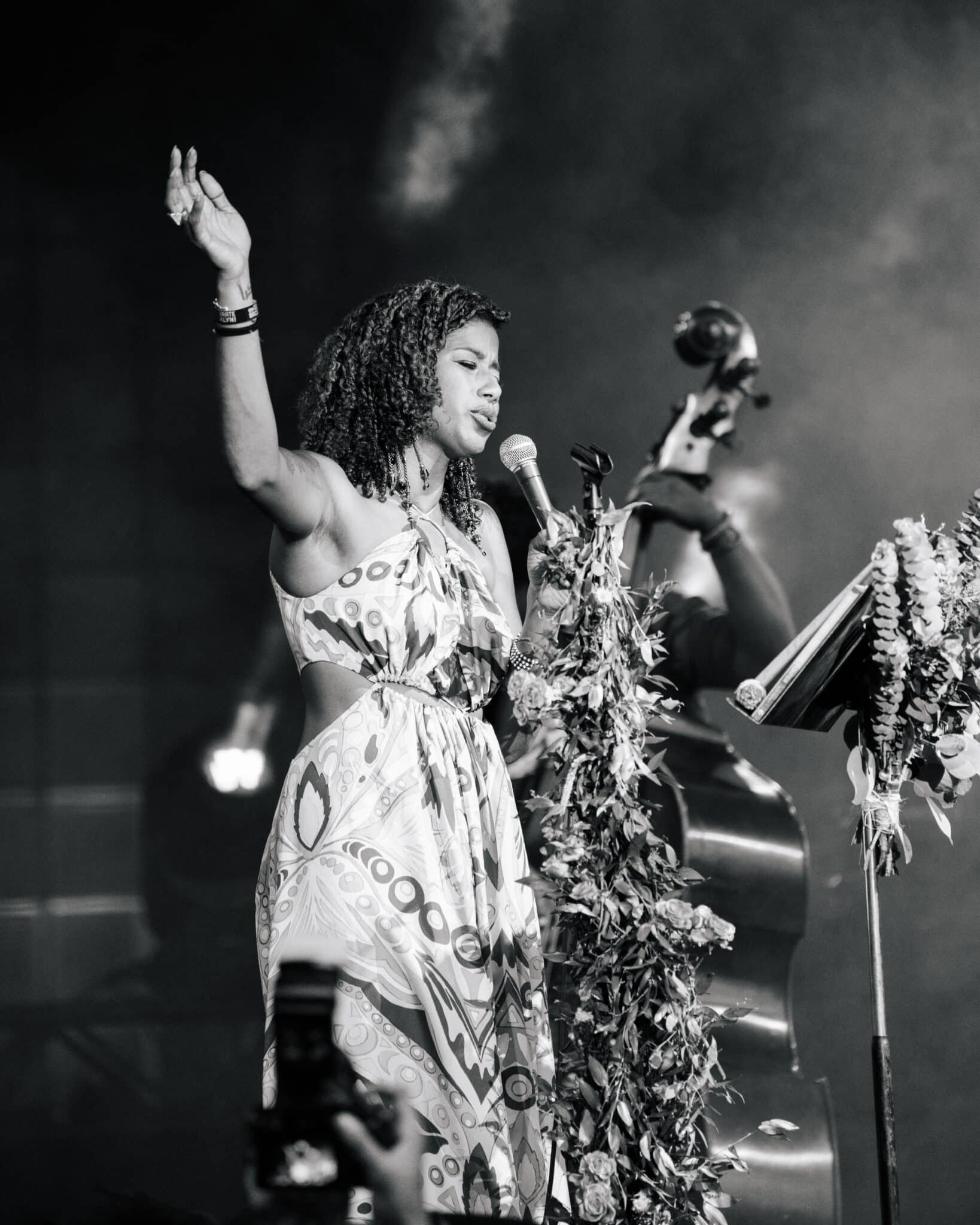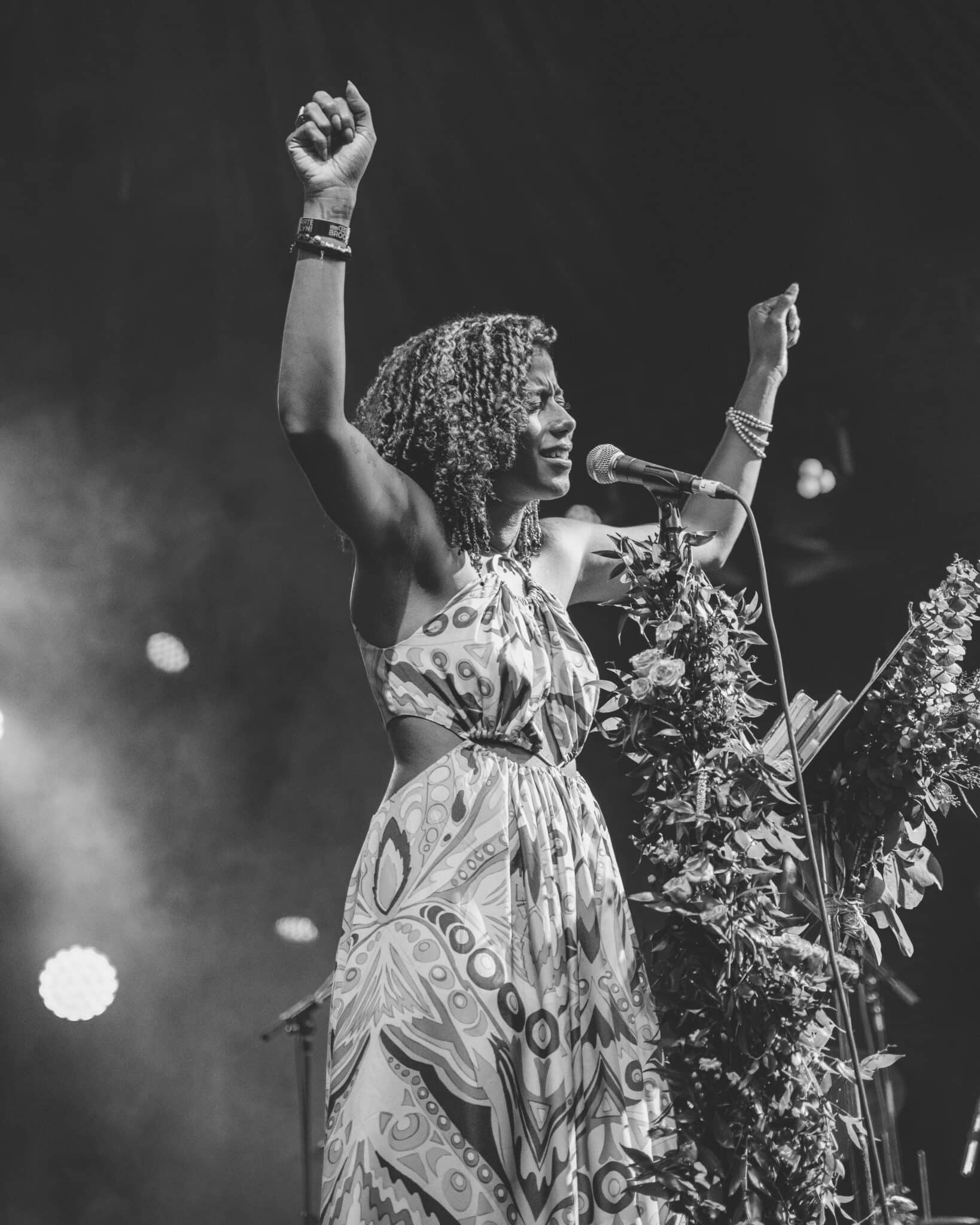Black Joy
Understanding Joy Through Poetry - A Conversation with aja monet
“Our joy will astonish the world because joy, true joy has always been and will always be justice"
Written by Janice Faith, edited by Karini Viranna
Photos provided by Daphne Kolader

The first time I heard the poem black joy was at Poetry Meets, a Berlin-based series of events curated by Jumoke Adeyanju where language meets sound, poetry meets music and the diaspora connects across disciplines, arts, genres, languages and laughter. In front of me, there was a Black woman who started to write because no one would listen, a woman whose light shines so bright it burns words onto paper and into hearts, and who filled the room with not just her own memories and dreams but our memories and our dreams.
Growing up to be the surrealist blues poet, storyteller and community organiser she was meant to be, aja monet’s writing and music, channel the revolutionary spirit of her teachers and ancestors. At age nineteen she became the youngest poet to ever hold the title of Nuyorican Poets Café Grand Slam Champion and went on to publish several books, including the award-nominated My Mother Was A Freedom Fighter. In 2023 she released her debut album “when the poems do what they do”, an album that speaks of Black resistance, love and joy, tugs at your heartstrings, roars in your face, holds you tight and wipes away your tears. It is filled with poems that push the boundaries of language, that were written with liberation in mind, and that are meant for everyone. Because when the poems do what they do, they do everything.
The first time I heard the poem black joy was at Poetry Meets, a Berlin-based series of events curated by Jumoke Adeyanju where language meets sound, poetry meets music and the diaspora connects across disciplines, arts, genres, languages and laughter. In front of me, there was a Black woman who started to write because no one would listen, a woman whose light shines so bright it burns words onto paper and into hearts, and who filled the room with not just her own memories and dreams but our memories and our dreams.
Growing up to be the surrealist blues poet, storyteller and community organiser she was meant to be, aja monet’s writing and music, channel the revolutionary spirit of her teachers and ancestors. At age nineteen she became the youngest poet to ever hold the title of Nuyorican Poets Café Grand Slam Champion and went on to publish several books, including the award-nominated My Mother Was A Freedom Fighter. In 2023 she released her debut album “when the poems do what they do”, an album that speaks of Black resistance, love and joy, tugs at your heartstrings, roars in your face, holds you tight and wipes away your tears. It is filled with poems that push the boundaries of language, that were written with liberation in mind, and that are meant for everyone. Because when the poems do what they do, they do everything.
How do you define Black Joy? Do you think that it is important that we highlight and discuss it?
I think joy is the ability to really be aware and present and to receive our feelings without judging them. It’s about treasuring this awareness, treasuring being alive. I don’t particularly like the notion of Black joy. But I think things are necessary in the moments that they are. Black joy is a way of talking about the allegiance between Black people and the experiences we've had in a world that racialises us. But you know, joy is joy. Often joy is coloured and deepened by our struggles through the many challenges of life so I think anybody who is in touch with their humanity can be in touch with the capacity to feel and to understand the joy of all people. As long as Black joy is not about the exclusion of others, it will always be necessary. And as long as we understand that Blackness is an ideological framework and value system.
Would you say that Black Joy is inherently political?
I think when we talk about politics we’re talking about people who are trying to govern the conditions of our lives and the ways that they navigate our planet’s resources. Whether you care about water, housing, healthcare, or education – it’s all political. We come into this world as tiny humans who must learn to live with, struggle against, and change the conditions that make it more difficult for us to be free, love, and live full, sustainable lives. So I think anything concerned with how we can live together on this earth is political.
What does the future we’re currently fighting for look like for you?
I don’t necessarily believe in utopias but I believe in anarchy rooted in empathy. Our governing should be rooted in how we can commit the least amount of harm. How do we avoid and de-escalate harm in any possible governing decision? How can we make it possible for all people to experience integrity, dignity, and decency throughout their lives? I believe in grassroots organising and people who love radically towards visions of their hearts, dreams, and desires.

"I believe in grassroots organising and people who love radically towards visions of their hearts, dreams, and desires."
Which Black writers, thinkers and artists have inspired you personally and in your writing? If you could go back in time, who would you like to talk to?
I often think about June Jordan who I’ve admired for many years. I also had the privilege of getting to know Amiri Baraka and especially now, the clarity and precision of his knowledge and analysis is something I wish I could lean into. I wish I could’ve spent more time in the presence of Ama Ata Aidoo.There are so many people I wish I could’ve spent more time with. I think that they're still here and if we are patient and present with ourselves, we can hear them. In moments when I feel very discouraged about where we are as a country or as a people or when I feel immense gratitude and joy, I know that nothing I'm experiencing could be possible without their sacrifice and their brilliance.
Your debut album is called when the poems do what they do. What is your intention for your album?
The title is a line from the poem For Sonia (Sanchez) and goes: “When the poems do what they do they get it done”. I was thinking about how to create a title that can be a doorway for people to experience the poems I chose for this album. When I wrote that verse I was leaning into the tradition of many poets who have done. Poems are not about passive witnessing, they’re about being an active participant in the archival and documentation of our lived experiences. They’re meant to mobilise people around the issues and feelings of the time. I think something you need to learn to let go of as an artist is the want to control how people receive your work.
Does it ever frighten you to share such deep parts of yourself with your poetry?
It’s hard to explain because if people don’t know you, they only know what they experience of you. As a Black woman, there’s a certain way I’ve had to navigate the world. I’ve been privy to more assaults on my physical body, my intelligence, and my agency to voice the things I’ve experienced. But then I understand that there are reasons why we are put in our bodies. I don’t think I’ll fully understand why my story has led me to where I am until I’ve had the years to live out my life and look back. I believe that poems are a place to contend with the interior landscape of our lives, the things that people cannot see, judge, and assess based on how we look. The place where I often feel the safest is my silence – a witnessing silence. I’ve been in this field of work for a long time and I’m only now feeling like my work is reaching and impacting people the way I would like it to.
Which Black writers, thinkers and artists have inspired you personally and in your writing? If you could go back in time, who would you like to talk to?
I often think about June Jordan who I’ve admired for many years. I also had the privilege of getting to know Amiri Baraka and especially now, the clarity and precision of his knowledge and analysis is something I wish I could lean into. I wish I could’ve spent more time in the presence of Ama Ata Aidoo.There are so many people I wish I could’ve spent more time with. I think that they're still here and if we are patient and present with ourselves, we can hear them. In moments when I feel very discouraged about where we are as a country or as a people or when I feel immense gratitude and joy, I know that nothing I'm experiencing could be possible without their sacrifice and their brilliance.
Your debut album is called when the poems do what they do. What is your intention for your album?
The title is a line from the poem For Sonia (Sanchez) and goes: “When the poems do what they do they get it done”. I was thinking about how to create a title that can be a doorway for people to experience the poems I chose for this album. When I wrote that verse I was leaning into the tradition of many poets who have done. Poems are not about passive witnessing, they’re about being an active participant in the archival and documentation of our lived experiences. They’re meant to mobilise people around the issues and feelings of the time. I think something you need to learn to let go of as an artist is the want to control how people receive your work.
Does it ever frighten you to share such deep parts of yourself with your poetry?
It’s hard to explain because if people don’t know you, they only know what they experience of you. As a Black woman, there’s a certain way I’ve had to navigate the world. I’ve been privy to more assaults on my physical body, my intelligence, and my agency to voice the things I’ve experienced. But then I understand that there are reasons why we are put in our bodies. I don’t think I’ll fully understand why my story has led me to where I am until I’ve had the years to live out my life and look back. I believe that poems are a place to contend with the interior landscape of our lives, the things that people cannot see, judge, and assess based on how we look. The place where I often feel the safest is my silence – a witnessing silence. I’ve been in this field of work for a long time and I’m only now feeling like my work is reaching and impacting people the way I would like it to.
"Poems are not about passive witnessing, they're about being an active participant in the archival and documentation of our lived experiences. They're meant to mobilise people around the issues and feelings of the time."

As you just mentioned, language is powerful. What would you say to writers out there who are losing hope in the power of their words in the face of what is happening in the world?
I’m still figuring that out myself. I don’t like the idea that I’m an activist because everything I’ve done has been in relationship with people. If anything I’d call myself an organiser. Community organising is about building deep relationships and bearing witness. Through poetry, we’re creating a blueprint for decolonising our imagination. Nikki Giovanni once said to me you’re not going to change the world. But we need to be steadfast about not letting the world change us.
Do you remember the first poem you wrote? What was your relationship with poetry at the time?
The first poem I wrote was for a school assignment and was about where I am from. My poems were always about a way of seeing things as they are and giving light to things unsaid. I was a hyper empathetic child who would pick up on other people’s feelings and nuances which greatly impacted the poet whom I would become. It helped me express things I couldn’t share at home, where I would shy away in the shadow of my overbearing mother. I’ve always struggled with my upbringing, and poetry was the place where I didn’t need to ask anybody if they cared to listen. I had to listen to myself and find a way to make my dreams, visions, and struggles known because they were too big to be held inside. For many years, I didn’t feel protected, so I had to learn to protect myself with poems. That little girl has never really left me.
What does joy look like for you?
Joy always finds new ways of showing up in my life. I’m thankful for that because it keeps me searching for moments that make me feel utter cosmic awe and connection. Recently, I took a trip to Jamaica, where part of my family is from. It was one of the last places my Uncle Daniel visited before his death. There’s a photo of him at a waterfall that we used at his service, and it’s so beautiful. It’s a photo of his sweet joy, a moment in time when he was invincible. So when I think about joy, I think about my waterfall. I long to be in that place of no fear, no harm – of invincible freedom. Daniel was the reason I wrote black joy. When I wrote it, I read him the first lines, and together, we went back and forth on the poem until it encompassed all the joy we could think of.
What was the last thing that put a smile on your face?
Watching the Kat Williams interview. Every day, there are little things that make me smile, like the store having my favourite juice.
As you just mentioned, language is powerful. What would you say to writers out there who are losing hope in the power of their words in the face of what is happening in the world?
I’m still figuring that out myself. I don’t like the idea that I’m an activist because everything I’ve done has been in relationship with people. If anything I’d call myself an organiser. Community organising is about building deep relationships and bearing witness. Through poetry, we’re creating a blueprint for decolonising our imagination. Nikki Giovanni once said to me you’re not going to change the world. But we need to be steadfast about not letting the world change us.
Do you remember the first poem you wrote? What was your relationship with poetry at the time?
The first poem I wrote was for a school assignment and was about where I am from. My poems were always about a way of seeing things as they are and giving light to things unsaid. I was a hyper empathetic child who would pick up on other people’s feelings and nuances which greatly impacted the poet whom I would become. It helped me express things I couldn’t share at home where I would shy away in the shadow of my overbearing mother. I’ve always struggled with my upbringing, and poetry was the place where I didn’t need to ask anybody if they cared to listen. I had to listen to myself and find a way to make my dreams, visions, and struggles known because they were too big to be held inside. For many years I didn’t feel protected so I had to learn to protect myself with poems. That little girl has never really left me.
What does joy look like for you?
Joy always finds new ways of showing up in my life. I’m thankful for that because it keeps me searching for moments that make me feel utter cosmic awe and connection. Recently I took a trip to Jamaica where part of my family is from. It was one of the last places my Uncle Daniel visited before his death. There’s a photo of him at a waterfall that we used at his service and it’s so beautiful. It’s a photo of his sweet joy, a moment in time when he was invincible. So when I think about joy I think about my waterfall. I long to be in that place of no fear, no harm – of invincible freedom. Daniel was the reason I wrote black joy. When I wrote it I read him the first lines and together we went back and forth on the poem until it encompassed all the joy we could think of.
What was the last thing that put a smile on your face?
Watching the Kat Williams interview. Every day there are little things that make me smile like the store having my favourite juice.
Get DADDY in your Inbox
Stay in the loop by subscribing to our newsletter